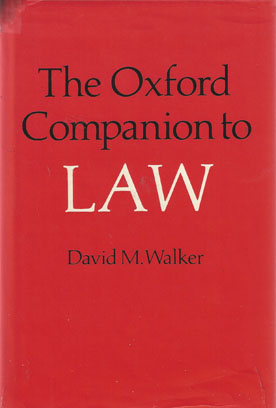
This book is neither a legal dictionary nor an encyclopaedia of legal rules, still less a legal guide for laymen. It is a compendium of information about the branches of legal science, legal systems, institutions such as courts and juries, notable judges and jurists,blegal concepts and ideas, major legal principles and important documents and cases.
While largely concerned with the legal systems of the U.K. it deals with legal history, legal philosophy, comparative law, international law, EEC law, and the main legal systems which share the common Western legal tradition, namely those of the U.K., the major Commonwealth countries, the U.S.A., and the countries of Western Europe.
It is not only a book for teachers and students of law, but for readers in the fields of history, philosophy, politics, government, and indeed all who in their work or reading come across legal references. Appendices list the holders of important legal offices since 1660. Much of the information here collected is not readily available anywhere else, and so much information on such a wide range of legal topics has never before so conveniently been brought together.
David M. Walker is Regius Professor of Law at the University of Glasgow.